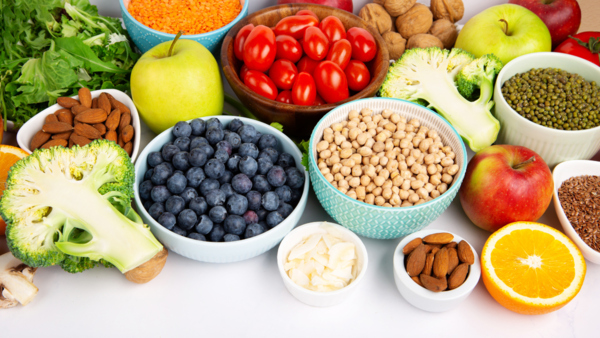A
plant-based diet
has been proven to
reduce inflammation
and the risk of cardiovascular diseases, obesity, diabetes, and even cancer. There is abundant research done by Harvard Medical School, Stanford, and several leading universities on the benefits of going on a
whole-food plant-based diet
. A
vegetarian diet
offers numerous health benefits, some of which include improved gut health, diverse gut flora, better digestion and metabolism, and reducing inflammation in the body.
Fresh fruits, vegetables, nuts, seeds, and whole grains are rich in complex carbohydrates that help feed the gut microbiota, which in turn helps reduce systemic inflammation, reduce cholesterol, and improve heart health. Here are some benefits of eating a vegetarian diet:
Boost immunity
According to Dr. Dimple Jangda, gut specialist, author, and founder of Prana by Dimple , “A healthy gut microbiome also helps improve the immune system and reduce production of inflammatory cytokines. Fresh fruits and vegetables are also rich in antioxidants like vitamin C, which helps boost immunity; vitamin E; carotenoids; and flavonoids, which help reduce oxidative stress in the body. They help fight the free radicals in our body and neutralize them, so that in turn helps reduce stress and inflammation in the body.”
Control fat deposits
Plant-based foods are also low in saturated fats, trans fats, which are found in animal-based products. Transfat increases the risk of chronic diseases, inflammation in the body, cholesterol, and stress. The secret to longevity as shown by many blue zones is a plant slant, where 95% of your diet comes from plant-based foods. The
Mediterranean diet
, in fact, has been found to be one of the most effective methods to improve good cholesterol, reduce inflammation in the body, and protect heart health.
Anti-inflammatory
Vegetarian foods contain phytonutrients, such as curcumin in turmeric and resveratrol in grapes, which have anti-inflammatory properties. These compounds can help reduce inflammation and support overall health. These foods also help lower blood pressure and are rich in potassium and low in sodium. Potassium helps reduce blood pressure by relaxing the blood vessels. The low sodium helps reduce hypertension, which is one of the triggers of heart disease.
Drops cholesterol levels
Remember, animal-based foods like meat, sea food, eggs, and dairy products can contribute to cholesterol. Whereas plant-based foods are low in cholesterol and rich in soluble fiber, which contributes to heart health. You can consume a whole food plant-based diet with health grains like beans, lentils, pulses, legumes, rice, and fresh fruits and vegetables, along with nuts and spices, which help reduce LDL (bad cholesterol) and thus reduce the risk of heart disease.
The high intake of antioxidants and healthy fats through nuts and seeds helps improve endothelial function, which is crucial for maintaining healthy blood vessels and reducing the risk of cardiovascular disease.
Curbs weight gain
A plant-based diet also helps in weight loss and ensuring the midriff fat or abdominal adiposity is less. It reduces the risk of obesity-related diseases and lowers the risk of type 2 diabetes. Whole-food vegetarian diet is considered one of the healthiest sustainable diet plans available in today’s modern eco system.
According to Dr. Hansa Ji Yogendra, director, The Yoga Institute, “When it comes to the yogic perspective, eating healthy or a sattvik diet is not only about health and harmony, but it is also about compassion—both for our bodies and for the environment. The yogic principle of Ahimsa, or non-violence, suggests that reducing harm to all living beings brings peace. Eating in a way that honours this principle creates compassion. This not only supports your physical body but also brings a sense of bonding with nature.”
From a scientific perspective, many plant-based foods are naturally rich in antioxidants, fiber, and anti-inflammatory compounds. Foods like seasonal fruits, vegetables, whole grains, legumes, nuts, and seeds contain phytonutrients and healthy fats that reduce chronic inflammation. Animal products are often high in saturated fats and cholesterol. They also cause higher levels of inflammation, which can contribute to heart disease, joint pain, and other chronic conditions.On the other hand, fiber from plant foods regulates blood sugar and cholesterol levels, reducing the risk of heart disease. Many plant foods, especially leafy greens, berries, and legumes, are packed with nutrients like potassium and magnesium, which support cardiovascular health.
The diet you need to follow to reduce dark circles
I’m Manas Ranjan Sahoo: Founder of “Webtirety Software”. I’m a Full-time Software Professional and an aspiring entrepreneur, dedicated to growing this platform as large as possible. I love to Write Blogs on Software, Mobile applications, Web Technology, eCommerce, SEO, and about My experience with Life.





